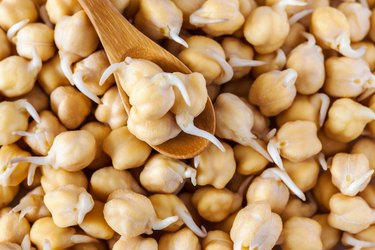
Chickpea sprouts, also known as garbanzo bean sprouts, are a protein-rich, high-carbohydrate food. To sprout these legumes soak the chickpeas in water overnight, then rinse and drain the chickpeas several times daily until there are sprouts, which look like white tails.
These chickpea sprouts are relatively low in calories but high in nutrients, so they'll fit into just about any meal plan. Here's a breakdown of chickpea sprout nutrition information (for a 100-gram serving):
Video of the Day
Video of the Day
- Calories: 165
- Fat: 4 grams
- Protein: 10 grams
- Carbohydrates: 24 grams
- Fiber: 3 grams
Calories
Chickpea sprouts are relatively low in calories, as a 100-gram serving contains 165 calories. That amount only comprises about 8 percent of the daily suggested intake of 2,000 calories.
However, it is higher than the amount in some other types of beans. For example, a 100-gram serving of black beans contains 130 calories.
Fat
Chickpea sprouts are low in fat, with each 100-gram serving containing 4 grams of fat. Of this fat, only 1 gram comes from saturated fat, a type of fat that may increase your risk of heart disease when you eat too much of it.
The American Heart Association suggests a daily limit of less than 16 grams of saturated fat to reduce cardiovascular disease risk.
Protein
Chickpea sprouts are a rich source of protein. Each 100-gram serving contains 10 grams of protein, which is 2 grams more than a cup of milk provides. Every cell in your body contains protein, and protein is continually broken down.
Therefore, daily intake of protein is vital for your overall health. The Office of Dietary Supplements (ODS) recommends that you eat 0.8 grams of protein daily for each kilogram of body weight (0.36 grams per pound).
Carbohydrates
Chickpea sprouts are also a rich source of carbohydrates. A 100-gram serving of the sprouts provides 24 grams of carbohydrates. Carbohydrates are your body's primary source of energy, making carbohydrate-rich foods a good choices for pre-workout meals.
Unless you've been put on a low-carb regimen by your doctor, the recommended intake of carbohydrates is 130 per day, according to the ODS.
Fiber
One type of carbohydrate chickpea sprouts provide is dietary fiber; each 100-gram serving contains 3 grams. Dietary fiber is important because it promotes feelings of fullness, helps stabilize blood sugar levels and may help reduce your cholesterol levels and risk of heart disease, according to Harvard School of Public Health. The recommended intake for fiber is between 25 and 38 grams.
Vitamins and Minerals
Chickpea sprouts are high in vitamin C, with 45 percent of the daily suggested intake in each 100-gram serving. Chickpea sprouts also contain 16 percent of the daily suggested iron intake in an 100-gram serving.
Adequate vitamin C intake may help prevent cancer, heart disease and the common cold, according to the ODS. Recommended vitamin C intake is between 65 and 75 milligrams per day.
- USDA National Nutrient Database: "Black Beans, Boiled, Without Salt"
- American Heart Association: "The Skinny on Fats"
- Office of Dietary Supplements: "Nutrient Recommendations: Dietary Reference Intakes (DRI)"
- Harvard School of Public Health: Fiber: "Fiber"
- National Institutes of Health Office of Dietary Supplements: "Vitamin C"
- USDA National Nutrient Database: "Chickpeas (garbanzo beans, bengal gram), mature seeds, raw"
Was this article helpful?
150 Characters Max
0/150
Thank you for sharing!
Thank you for your feedback!